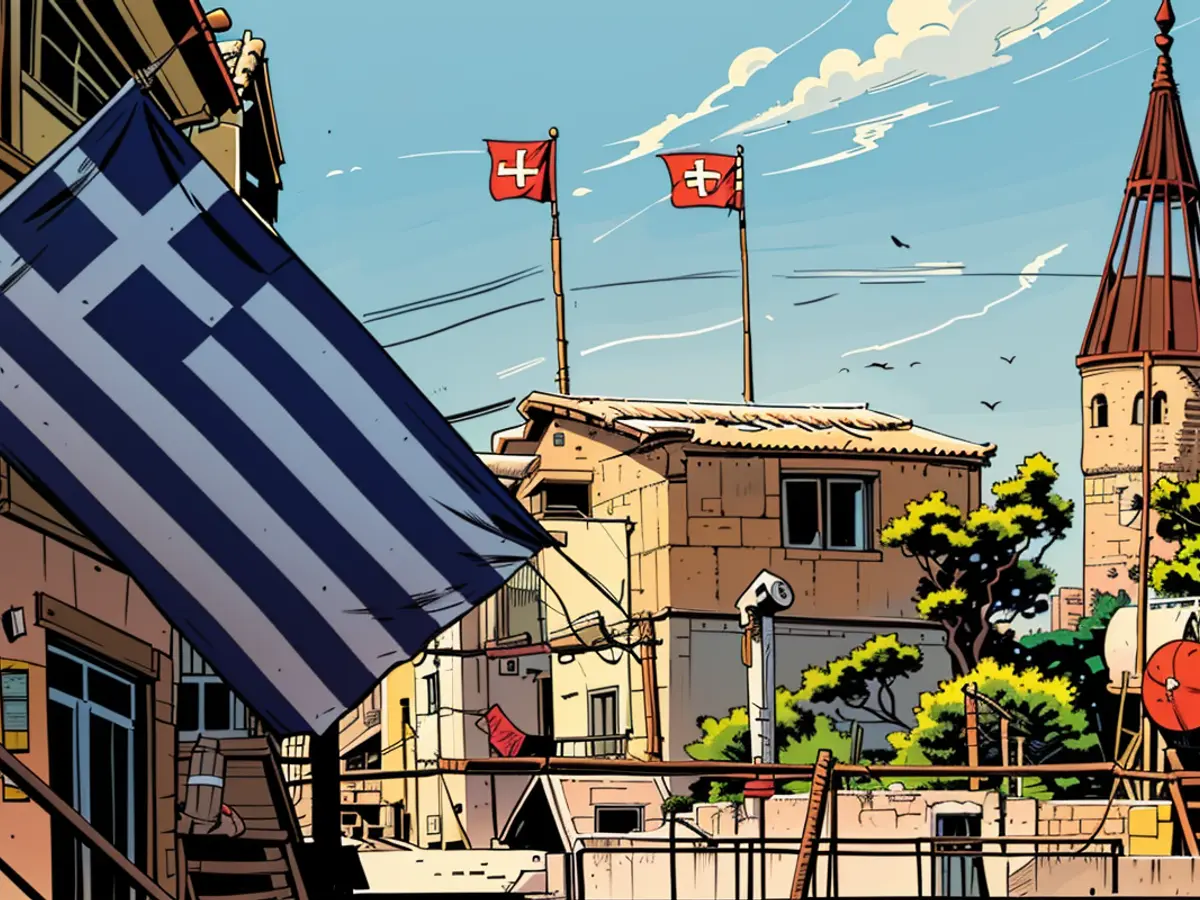Cyprus: No signs of reconciliation on the 50th anniversary of the Turkish invasion
Erdogan participated in a military parade in the northern part of the divided capital on the anniversary of the event. He expressed his rejection of the resumption of the last, broken-off talks under UN mediation on Cyprus reunification. This would be "of no use to anyone," Erdogan said. "We believe that a federal solution on Cyprus is not possible," Erdogan added.
Turkey is ready to negotiate "permanent peace and a solution," Erdogan stated. However, the "Turkish-Cypriot and Greek-Cypriot must sit equally at the table." The Turkish Republic of Northern Cyprus, which was proclaimed in 1983, nine years after the Turkish invasion, is recognized only by Turkey worldwide. Erdogan had stated in 2021 that he was revoking a continued division of Cyprus into a Turkish North and a Greek South.
However, Christodoulides aims for a common Cyprus state with a federation of both language groups. "Whatever Mr. Erdogan and his representatives in the occupied areas do or say, Turkey is still responsible for the violation of the human rights of the entire Cypriot people and the violation of international law," said the head of state of the Greek Cypriot Republic in the southern part of the island. His government will continue "to do everything possible to free and unite our country."
At around 5:30 a.m. local time (4:30 a.m. MESZ) on a Saturday morning in the EU member state of Cyprus, sirens were heard. They marked the time when, in 1974, the Turkish army began the so-called Operation Atilla.
In its course, Turkey captured a third of the entire island's territory and displaced around 40% of the population. According to the Cyprus Missing Persons Committee, there are still 750 Greek Cypriots and 200 Turkish Cypriots missing.
For the commemorative events in the Republic of Cyprus, Greek Prime Minister Kyriakos Mitsotakis was expected on Saturday evening. In May, Mitsotakis visited Erdogan in Ankara, which was seen as a sign of further relaxation of Greek-Turkish relations.
The first Turkish troops landed in northern Cyprus on July 20, 1974. The Turkish government justifies the invasion with the protection of the Turkish minority. Before that, officers of the Greek Cypriot National Guard, with the support of the then Greek military junta, had driven Makarios, the Orthodox Archbishop of Cyprus, out of the presidency of the Republic of Cyprus. Their goal was the union of the island with Greece, which the Cypriot Turks fiercely opposed.
Since then, the island has been politically divided: In the Turkish-controlled area, the Turkish Republic of Northern Cyprus was proclaimed in 1983, which is recognized only by Turkey worldwide and heavily reliant on Turkish support. The boundary between the part under the control of the Republic of Cyprus and the Turkish-controlled part still runs through Nicosia, which is today the only divided capital city in the world. The boundary follows a buffer zone, which is monitored by a UN peacekeeping mission.
- Nikos Christodoulides, the head of state in the southern part of Cyprus, criticized Erdogan's stance on resuming UN-mediated talks for Cyprus reunification, calling it "of no use to anyone."
- Advancement towards reconciliation between Cyprus and Turkey seems uncertain, as Erdogan asserted that a federal solution for Cyprus is not feasible.
- Kyriakos Mitsotakis, the Greek Prime Minister, was expected to attend commemorative events in the Republic of Cyprus to mark the anniversary of the Turkish Invasion.
- In 1974, Turkey marked the 50th anniversary of their invasion of Cyprus, capturing a third of the island's territory and displacing around 40% of the population.
- Recep Tayyip Erdogan, the Turkish President, participated in a military parade in the northern part of the divided capital and expressed his opposition to UN-led talks for Cyprus reunification.
- Despite Erdogan's rejection of UN mediation, Turkey is ready to negotiate a "permanent peace and solution" as long as Greek and Turkish Cypriots are equally represented at the table.
- To commemorate the anniversary, sirens were heard in Cyprus, marking the time when Turkish troops began their invasion in 1974, leading to the displacement of many and the division of the island.
- The Turkish Republic of Northern Cyprus, recognized only by Turkey worldwide, was proclaimed in 1983 and is heavily reliant on Turkish support, as it has yet to achieve recognition from the international community.







